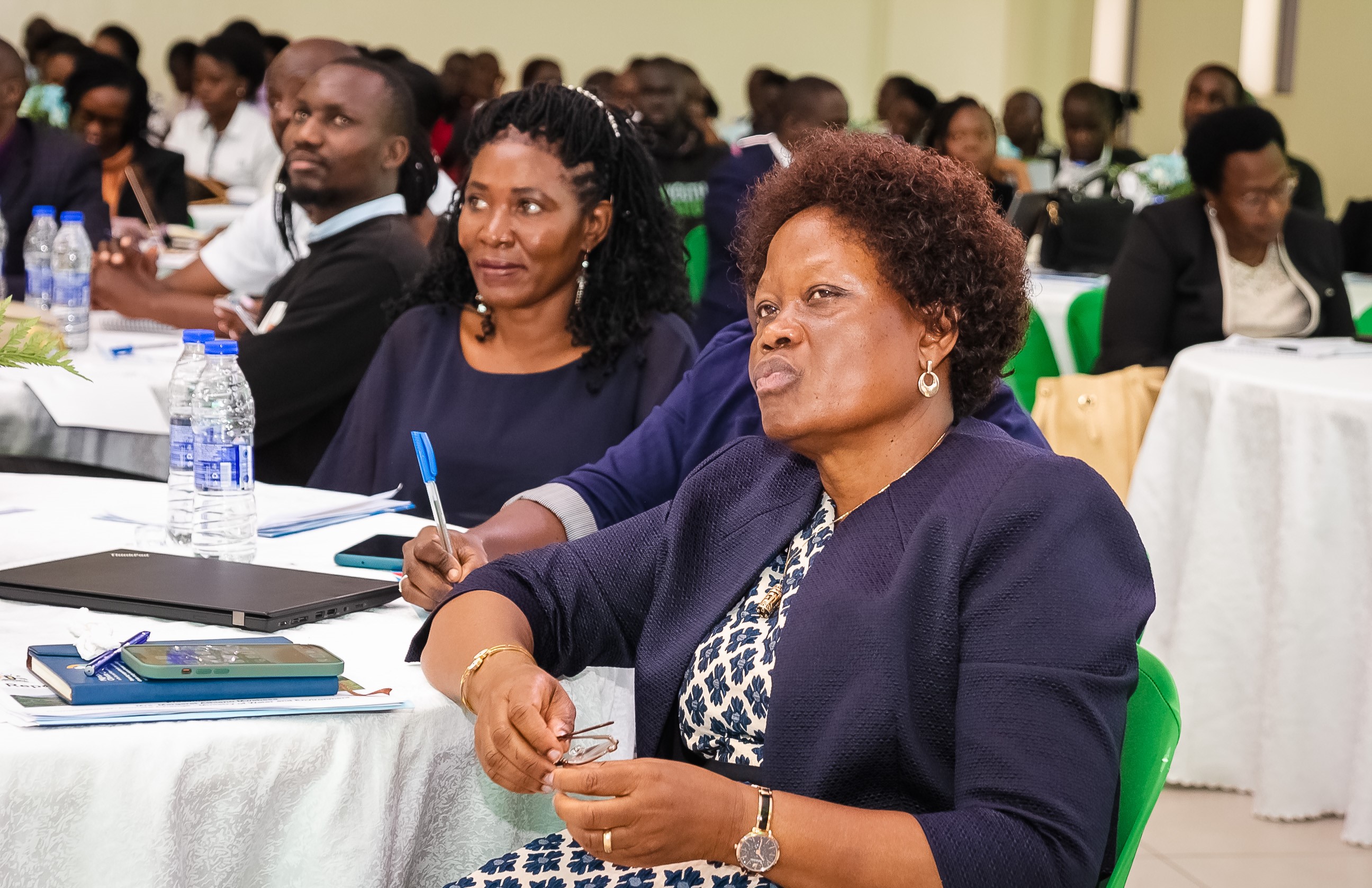Uganda raises ambition to deal with greenhouse gas emissions in new climate change plan.
March 10, 2023
The Rt. Hon. Rebecca Kadaga (Second right), Hon. Sam Cheptoris (First right) and Ms. Elsie Attafuah (Centre) and stakeholders during the National Post COP27 Forum and Launch of Uganda’s updated NDC.
Uganda has increased its ambition to reduce greenhouse gases (GHG) emissions from 22% to 24.7% in the new climate change plan also known as the Nationally Determined Contribution (NDC). The plan presents the country’s intention to reduce greenhouse gas emissions, deal with the effects of climate change and fulfill aspirations of the Paris Agreement.
The revised NDC was launched on 2 March 2023, during a national reflection workshop on the means of implementing the country's climate change plan based on the reflections and outcomes of the 27th Conference of Parties (COP27) held between 6 and 12 November 2022, in Sharm El-Sheikh, Egypt. The national reflection workshop was organized by the Ministry of Water and Environment in partnership with the United Nations Development Programme (UNDP).
Speaking during the launch, the First Deputy Prime Minister of Uganda and Minister for East African Community Affairs Rt. Hon. Rebecca Kadaga welcomed the COP27 resolution on nature-based solutions, which acknowledges the importance of food, water bodies, and the right to a healthy environment.
“This is highly significant for Uganda as it is tantamount to global recognition of the critical aspects that are a cornerstone to Uganda’s development and poverty eradication efforts,” she said.

Rt. Hon. Rebecca Kadaga during the event.
Financing Uganda’s Climate Change Plan
The Rt. Hon. Kadaga observed that the pledges made during COP27 fall short of the commitment of developed countries to mobilize US$100 billion annually for developing countries to address climate change.
“Uganda and many developing countries expressed dissatisfaction with the way finance is being provided, including the large percentage coming as loans, increasing the debt burden in already debt-stressed countries.”
Although many Least Developed Countries (LDCs) like Uganda have contributed less to the climate change crisis, they are most affected by its effects. Uganda now needs approximately $28.1 billion to implement her updated NDC and out of this, Government is expected to meet 15% to support the implementation of the non-conditional measures and actions.
Hon. Sam Cheptoris, Minister of Water and Environment, at the launch of Uganda’s updated NDC.
On his part, Hon. Sam Cheptoris, the Minister of Water and Environment, highlighted need for developed countries to keep their promise on climate finance. “Our hands are tied, and we cannot do much unless the developed world fulfills their pledge of $100 billion per year as discussed during the COP27,” he said.
As a remedy to the financing dilemma, Ms. Elsie Attafuah, the UNDP Resident Representative, called for the design of innovative climate financing mechanisms to aid mobilization of additional resources to support implementation of climate actions.

Ms. Elsie Attafuah, the UNDP Resident Representative in Uganda, speaking during the event.
Uganda’s updated NDC
Besides raising her ambition of reducing greenhouse gases from 22% to 24.7% by 2030, in the updated NDC, Uganda also identifies additional targets to be achieved by 2030. These include having 152,622 hectares under irrigation, ensuring access to electricity to 75% of the population and having 50% of local governments with climate action plans. Others are having 2.5 million hectares of forest landscape restored and 11 million people aware of climate change by 2030.
UNDP, under its flagship initiative Climate Promise, supported the Government of Uganda through the Ministry of Water and Environment to develop the NDC implementation and resource mobilization strategy.
Climate financing through carbon markets
According to UNDP experts, carbon markets, are gaining significant traction in recent years, with about 23% of global emissions now covered by some form of carbon pricing. Although COP27 deferred most of the operational modalities aspects of this trade to COP28, Uganda has made substantial progress in establishing the modalities of this trade. A national taskforce on Climate Change Mechanisms was inaugurated in October 2022 with UNDP’s support.

Mrs. Margaret Athieno Mwebesa, Commissioner Climate change Department and other participants at the event.
Mrs. Margaret Athieno Mwebesa, the Commissioner, Climate Change, noted that if Uganda does it well, it could earn a lot of money to finance its climate actions. “Carbon trading is one of the ways countries can cooperate to reduce on their emissions; so, we all need to take it very seriously. Carbon markets are tradable assets and if we do it well, it can bring a lot of money to the country,” she said.
UNDP’s contribution to Uganda’s climate change story.
Leveraging the NDCs as an umbrella, UNDP is bringing together its extensive infrastructure, networks and breadth of substantive offers to provide comprehensive support on Uganda's NDC implementation. This effort is underpinned by strong support to just transition measures, as well as leveraging UNDP's strength through measures that align UNDP’s broader portfolio with the Paris Agreement and NDCs.
A framework which includes guidelines and regulations for carbon markets under Article 6 of the Paris Agreement and the voluntary carbon market mechanisms are being designed by the government with UNDP's support to ensure that Uganda taps into carbon financing opportunities to deliver on its NDC targets. Similarly, the UN Decade of Ecosystems Restoration 2021-2030 and other initiatives will help Uganda to realize Uganda’s climate change targets.
Through the presidential initiative on wetlands, UNDP is implementing the Building Community Resilience, Wetland Ecosystems and Associated Catchments in Uganda project in 24 districts in eastern and south-western Uganda. In partnership with UNEP, UNDP also supported Government to prepare Uganda Wetlands Atlas and the design of the Uganda Natural Resource Information System (NARIS) to generate near real-time data to revolutionize the management of natural resources, initially focusing on wetlands and forests.
UNDP has also further promoted access to energy services specifically in health centers where solar has been provided to 24 health centers across the country; this we believe is a big milestone to promote renewable energy in the social services sector.

 Locations
Locations